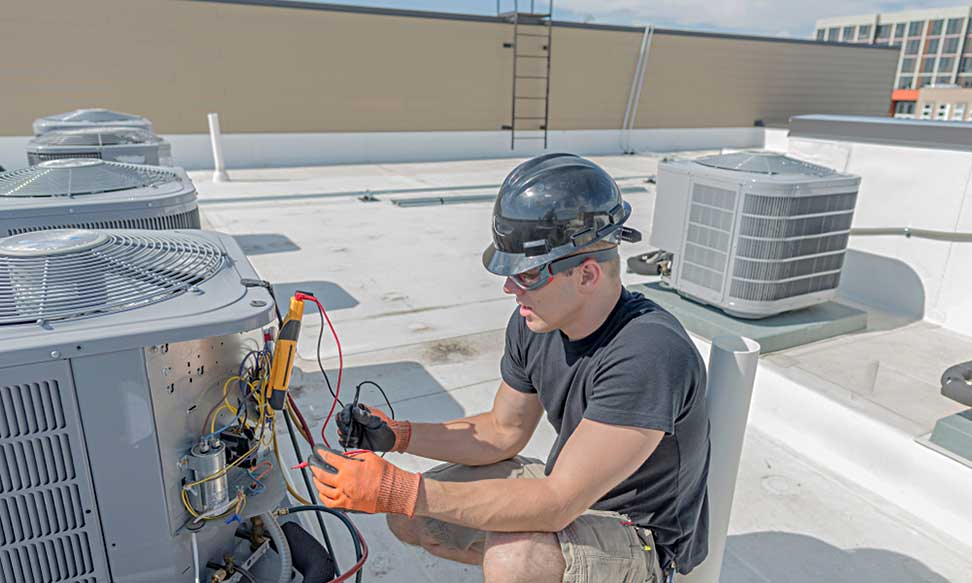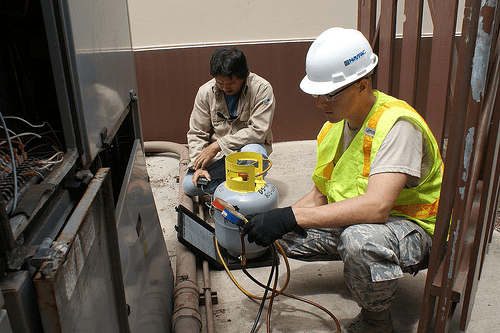Red Flags Your Home Needs Immediate heat pump service
Red Flags Your Home Needs Immediate heat pump service
Blog Article
Selecting Between a Heatpump and Heating System: Trick Factors To Consider for Your A/c Needs
When reviewing home heating choices for a/c requires, the decision between a heatpump and a furnace can be complicated. Each system supplies unique advantages customized to specific environments and energy effectiveness goals. Understanding these distinctions is important for making an informed selection. Key aspects such as installation expenses and ecological influence better make complex the selection procedure. Which option absolutely straightens with one's convenience and sustainability preferences? The following sections will check out these factors to consider carefully.
Understanding Warmth Pumps: How They Work and Their Benefits
While numerous property owners think about different home heating choices, understanding exactly how warm pumps function and their advantages can considerably affect their choice. Warmth pumps run by moving warm instead of producing it. In the winter, they extract warm from the outdoors air or ground and move it inside, while in the summertime, they reverse this process, cooling down the home by expelling warmth outside. This dual capability makes them flexible for year-round environment control.One of the primary advantages of heatpump is their power performance. They make use of significantly less power contrasted to standard heating unit, possibly leading to lower utility costs (heat pump installation ooltewah tn). Additionally, heat pumps have a smaller carbon impact, making them an eco-friendly selection. They additionally require less upkeep than traditional systems, adding to long-term price savings. On the whole, recognizing the auto mechanics and benefits of warm pumps can aid home owners make informed choices concerning their home heating and cooling demands
Exploring Heaters: Types, Operation, and Benefits
Furnaces can be found in numerous kinds, consisting of gas, electric, and oil versions, each with distinct operational systems. Comprehending these distinctions is important, as they influence performance and heating efficiency. Furthermore, heaters provide countless advantages, such as regular heat result and integrity in colder climates.
Sorts of Heaters
Furnace can vary significantly in layout and operation, with heating systems being a preferred option amongst house owners. There are a number of kinds of heating systems, each using different gas sources and innovations. Gas furnaces prevail, leveraging all-natural gas to generate heat efficiently. Electric furnaces, on the various other hand, make use of electric resistance to produce heat, frequently favored for their straightforward installation. Oil heating systems, while less common, are effective in areas with limited gas access (furnace replacement). In addition, condensing heating systems make the most of energy efficiency by capturing and recycling exhaust gases. Each type operates via a system of warmth exchangers and ductwork to disperse cozy air throughout a home. Comprehending the distinctions in between these heating system types is essential for notified cooling and heating decisions
Advantages of Heating systems
For property owners seeking trustworthy warmth throughout cool months, the benefits of heaters are significant. Heating systems provide consistent heating, making certain also temperature levels throughout the home. They are specifically reliable in severe cool, typically exceeding heat pumps in icy problems. Numerous types, including gas, electric, and oil heating systems, provide versatility to fulfill varied needs and preferences.Furnaces additionally have a tendency to have reduced first installment prices compared to heat pumps, making them a much more easily accessible alternative for numerous. Their durable layout adds to a much longer lifespan, with lots of devices lasting over 15 years with appropriate maintenance. Furthermore, contemporary heaters are often geared up with innovative modern technology for improved effectiveness, which can bring about reduced power costs. In general, heating systems stay a reputable option for efficient home heating.

Power Efficiency: Comparing Warm Pumps and Furnaces
When comparing energy effectiveness in between warmth pumps and heating systems, the Seasonal Power Performance Proportion (SEER) plays a necessary role in establishing efficiency. In addition, an operational cost evaluation reveals the lasting financial effects of each system. Recognizing these aspects can guide house owners in making educated decisions concerning their heating options.
Seasonal Energy Effectiveness Proportion
Energy effectiveness plays a necessary role in the decision-making procedure between heatpump and heaters, particularly when thinking about the Seasonal Energy Performance Ratio (SEER) This metric actions the cooling performance of heat pumps over an entire cooling period, supplying a standard way to evaluate performance. Greater SEER rankings indicate better power performance, converting to reduced power usage and lowered energy costs. On the other hand, heaters are typically examined making use of the Annual Fuel Use Effectiveness (AFUE) ranking, which mirrors home heating performance. When comparing these 2 systems, homeowners ought to focus on SEER ratings for warmth pumps, as they directly effect overall energy savings look at here and environmental sustainability. A detailed understanding of SEER can especially affect the lasting satisfaction and cost-effectiveness of the picked heating and cooling solution.
Functional Cost Analysis
Understanding the operational expenses related to heatpump and furnaces is essential for home owners evaluating their choices. Warmth pumps typically provide higher power efficiency, transforming electrical energy into warmth with very little waste. This causes lower regular monthly utility expenses, especially in modest environments. On the other hand, conventional heating systems, especially gas models, might have lower ahead of time costs however can incur greater operational expenditures gradually as a result of fuel rates and performance ratings.Moreover, heatpump can work as both home heating and cooling down systems, possibly lowering the need for separate HVAC devices. While first investments for warmth pumps might be greater, their long-term cost savings in energy performance can make them a more cost-efficient option for lots of homes. Careful evaluation of regional power rates is vital to identify the finest option.
Installment Prices: What to Anticipate for Each Heating Unit
Installation prices for furnace can differ considerably in between heatpump and heating systems, affecting property owners' choices. Heatpump usually have greater in advance setup costs, generally varying from $3,500 to $8,000, depending on the system size and complexity of installation. This includes the outdoor device, indoor handling system, and needed ductwork alterations. Conversely, heaters tend to have reduced first prices, averaging between $2,500 and $6,000, which can be appealing for budget-conscious homeowners. Installation expenditures can boost if substantial ductwork is required.Moreover, the option of gas kind for furnaces-- natural gas, gas, or electric-- can likewise impact installment costs. While heatpump use power effectiveness, their first financial investment may discourage some purchasers. Ultimately, assessing setup expenses together with long-term cost savings and effectiveness will aid homeowners in making educated decisions concerning their heating systems.
Climate Considerations: Which System Executes Better in Your Area
Exactly how do climate conditions affect the performance of heating systems? The efficiency of heat pumps and heating systems can differ greatly depending on the regional climate. In modest environments, warmth pumps excel by effectively moving warm from the outdoors air, making them an energy-saving option. Their efficiency decreases in extremely cool temperatures, where they may battle to remove adequate warm. Conversely, furnaces, especially gas models, offer consistent and reliable warmth no matter outside conditions, making them more effective in colder regions.In locations that experience milder winter seasons, heatpump can operate successfully year-round, providing both heating and cooling. On the other hand, regions with severe winters months typically benefit from the toughness of heating systems. Eventually, recognizing the neighborhood climate is necessary when deciding between a heatpump and a furnace, as it straight impacts their operational performance and overall efficiency.
Maintenance Needs: Long-Term Treatment for Heat Pumps vs. Furnaces
While both heatpump and furnaces call for normal upkeep to assure peak efficiency, their specific needs and care routines vary substantially. Heating systems typically require less regular attention, with annual assessments sufficing to inspect for gas leakages, clean filters, and assess general capability. Their easier style typically enables straightforward repairs.In comparison, heatpump demand biannual upkeep as go to website a result of their twin duty in home heating and cooling. This includes cleansing coils, examining refrigerant levels, and guaranteeing that both the interior and outdoor devices operate at their finest. In addition, warm pump maintenance usually includes even more detailed components, making specialist servicing essential.Neglecting maintenance can bring about reduced efficiency and boosted energy expenses for both systems. Eventually, home owners must think about these long-lasting care demands when picking between a heatpump and a furnace, as aggressive upkeep can prolong the life expectancy and efficiency of either system significantly.
Ecological Impact: Picking a Sustainable Heating Choice
The ecological impact of home heating systems is a critical examination for house owners seeking sustainable alternatives. Warm pumps are normally much more energy-efficient than standard furnaces, as they move warm instead than create it, greatly minimizing carbon emissions. By utilizing renewable resource resources, such as geothermal or air-source heatpump, property owners can better lessen their environmental footprint.On the various other hand, all-natural gas heating systems emit greenhouse gases and contribute to air contamination, though they frequently supply this post greater warmth outcome. Developments in innovation have actually led to the advancement of high-efficiency heaters that decrease emissions.Ultimately, selecting a home heating system includes evaluating efficiency against environmental effect. Homeowners are encouraged to reflect on neighborhood power resources and incentives for sustainable systems, making sure a choice that straightens with both individual convenience and ecological duty. The decision affects not just instant convenience but additionally long-term sustainability and environmental health.
Often Asked Concerns
Just How Long Do Heat Pumps and Furnaces Usually Last?
The life-span of heat pumps usually ranges from 15 to twenty years, while heaters can last between 15 to three decades. Routine maintenance considerably affects their longevity and efficiency in supplying home heating options.
Can I Make Use Of a Heat Pump in Exceptionally Cold Climates?
Heatpump can operate in very cold environments, yet their efficiency decreases as temperatures drop. In such conditions, supplemental home heating sources may be essential to keep comfy indoor temperatures and ensure peak performance.

What Is the Sound Degree of Warmth Pumps Versus Furnaces?
The noise degrees of heatpump and heaters vary significantly. Generally, warmth pumps operate more quietly than typical heaters, making them preferable for those sensitive to sound, while heating systems might produce louder operational sounds during home heating cycles.
Are Warm Pumps Suitable for Both Heating & Cooling?
Heatpump are without a doubt ideal for both heating and cooling (heat pump installation ooltewah tn). They function by moving warmth, giving reliable temperature control year-round, making them a versatile choice for homeowners looking for an all-in-one HVAC solution
What Size Heater Do I Required for My Home?
Identifying the proper size heater for a home calls for assessing aspects such as square video footage, insulation high quality, local climate, and the home's design. Consulting a specialist can assure an accurate analysis and perfect comfort. Warm pumps typically supply higher energy performance, converting electrical power right into heat with very little waste. In moderate climates, warm pumps excel by efficiently moving warmth from the outdoors air, making them an energy-saving choice. Conversely, furnaces, particularly gas models, offer constant and reputable warm no matter of outdoor conditions, making them more suitable in colder regions.In locations that experience milder winters, heat pumps can operate properly year-round, giving both heating and air conditioning. Heat pumps are usually more energy-efficient than traditional heaters, as they move heat instead than generate it, considerably minimizing carbon exhausts. By making use of sustainable power sources, such as geothermal or air-source warm pumps, property owners can additionally reduce their eco-friendly footprint.On the other hand, all-natural gas heaters send out greenhouse gases and contribute to air pollution, though they typically give higher warmth result.
Report this page